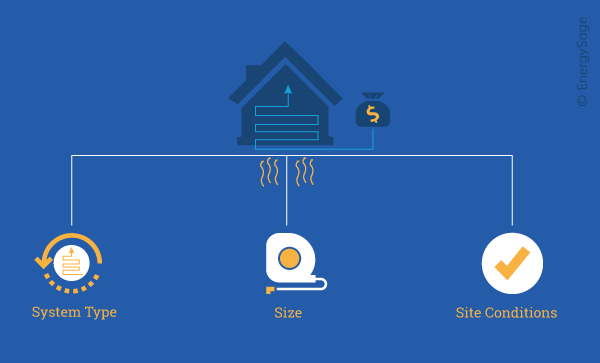
(Energy Sage)
Geothermal heat pumps, also called "ground-source" or "water-source heat pumps," which utilize near-constant ground or water temperatures to transfer heat between your house and the ground or a nearby water source, are not only more efficient than conventional pumps but can also save homeowners money in the long run.
Low Operating Costs
Although they can be more costly to install, geothermal heat pumps have low operating costs. You should consider the size of your property, the climate, soil conditions, and the landscape when determining the best type of geothermal heat pump system. (Ground-source or water-source heat pumps can be used in more extreme climates than air-source heat pumps.)
Another great benefit of geothermal pumps is their longevity. You can conservatively expect a new geothermal heat pump ground loop to last for more than 50 years and the indoor components to last for about 15 years. This means you’ll have access to reliable, low-cost heating and cooling for several decades, which in turn means significant lifetime savings from geothermal. (Energy Sage)
Increased Efficiency
One of the biggest advantages of ground source heat pumps is their efficiency. A well-installed ground source heat pump system is capable of providing 3 to 4.5 times the amount of electrical energy it consumes in the form of heat energy for your home.
This is possible because ground source heat pumps move heat rather than burning fuel. As a comparison, the best oil-fueled furnaces can only approach a 1-to-1 ratio of energy consumed to heat energy provided. (Energy Sage)
GRECs: Geothermal Renewable Energy Credits
In 2012, Maryland became the first state in the country to make the energy generated by GHC technologies eligible for the Renewable Portfolio Standard (RPS) as a Tier 1 renewable source (HB 1186). GHC system owners are also suitable for Renewable Energy Credits (RECs), equivalent to 1 MegaWatt-hour (MWh) of electricity.
For more information go to GRECs 101 and the Maryland Renewable Energy Portfolio Standard Program.
Rebates and Incentives
If you are concerned about the price tag for geothermal energy, understanding the rebates and incentives available to you can help you determine if it is something you want to invest in. According to the Department of Energy, they have an average payback period of 5-10 years.
Federal Clean Energy Tax Credits for Consumers
The federal Clean Energy Tax Credits for Consumers covers 30 percent of the cost of heat pumps, capped at $2,000 each year, but resets annually so it can be used for other projects. Both homeowners and renters are eligible for tax credits for certain equipment and energy efficiency upgrades, including the installation of new electric panels. (EPA)
Inflation Reduction Act
In addition to new federal tax credits, the Inflation Reduction Act (also known as the Residential Renewable Energy Tax Credit)includes nearly $9 billion to states and tribes for consumer home energy rebate programs focused on low-income consumers. Communities will be able to electrify home appliances and perform energy-efficient retrofits, such as installation of heat pumps. (EPA)
Longterm Savings
Numbers from the US Environmental Protection Agency (EPA) show that homeowners using geothermal systems may realize savings of 30-70% on heating costs and 20-50% on cooling costs compared to conventional systems.
Here is an example of residential savings. (Climate Master Geothermal Calculator)
Location: Maryland
Home Type (New/Existing): Existing
Conditioned Space: 2000 sq. ft.
Insulation and Air Leakage: Average
HVAC Equipment: 3 - 15 years old
HVAC Equipment Efficiency: Standard
Heating Type: Natural Gas
Water Heating Type: Natural Gas
Comments
0 comments
Please sign in to leave a comment.